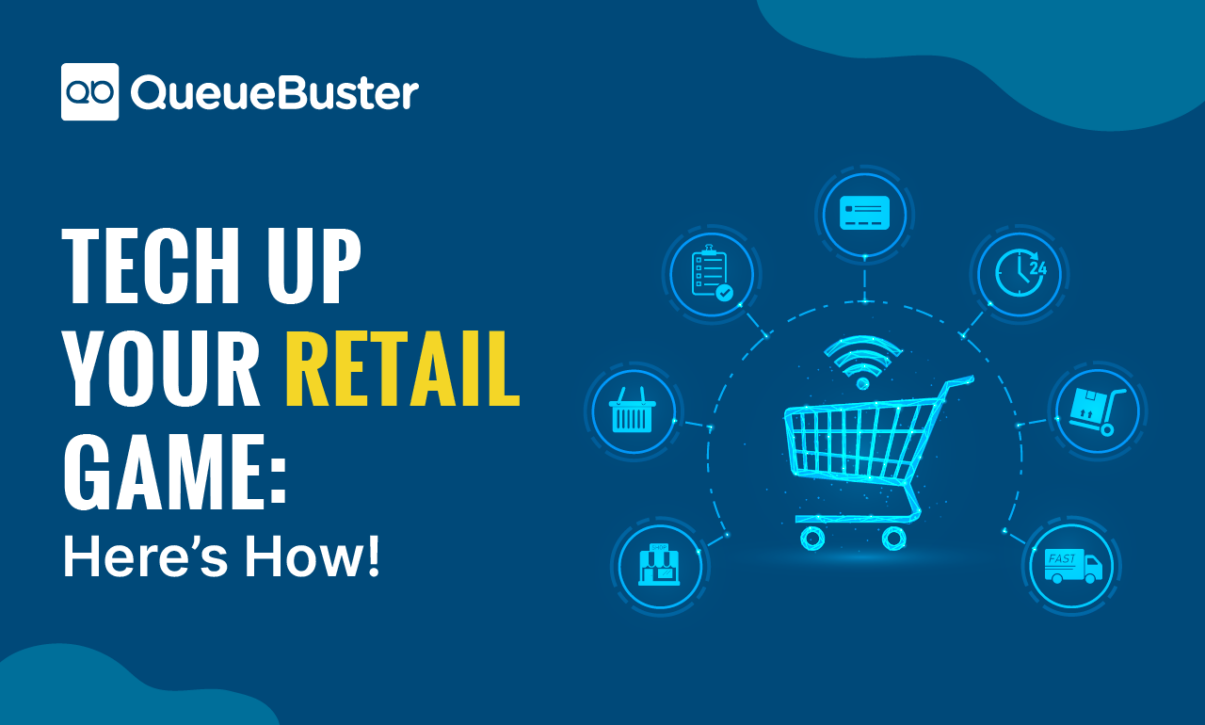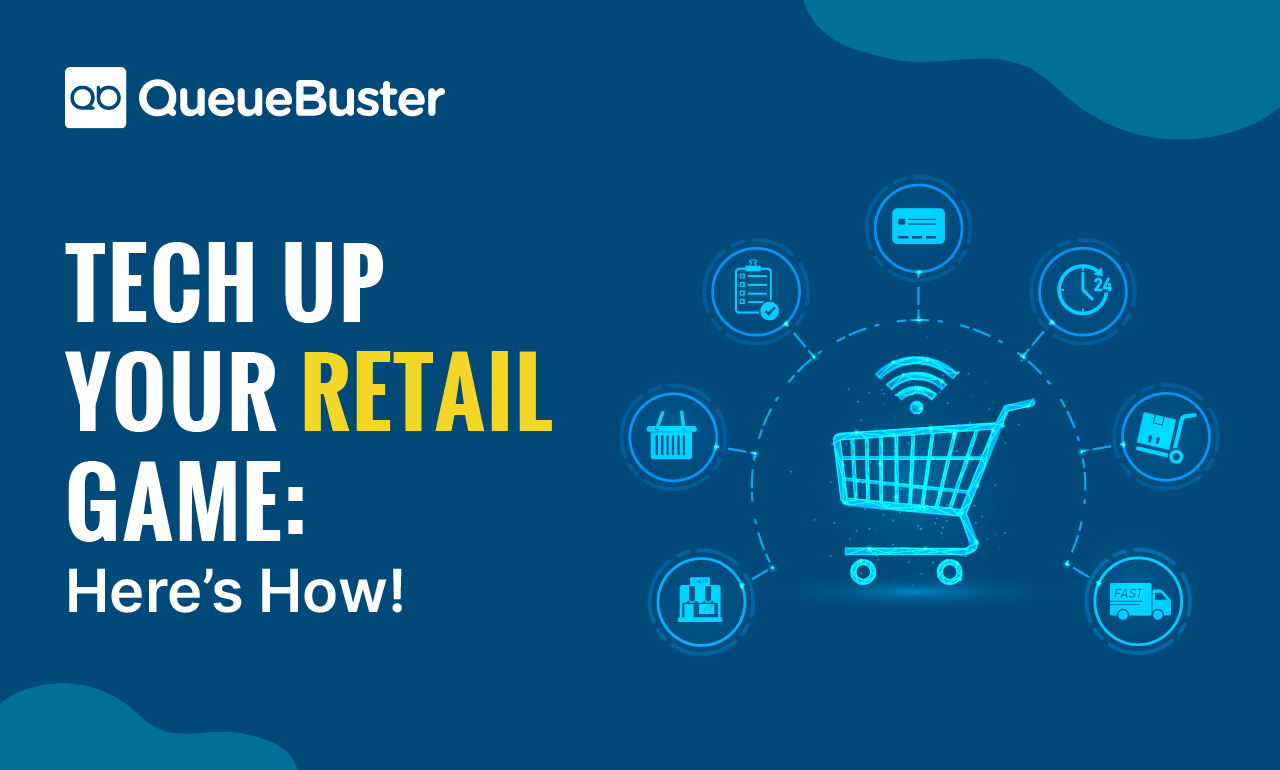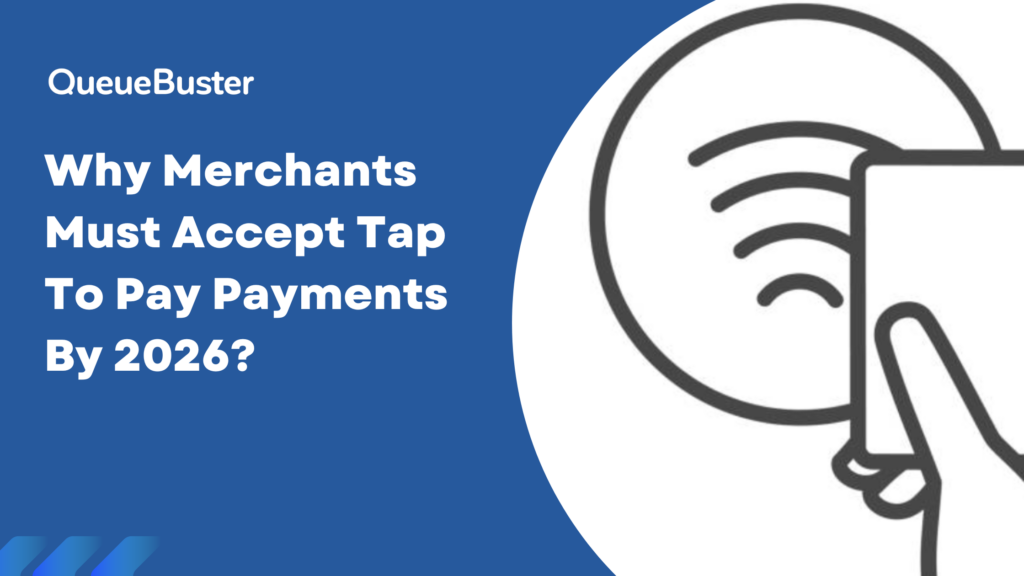
Tech Up Your Retail Game: Here’s How!
Tech Up Your Retail Game: Here’s How!

By QueueBuster Team Published: August 27th, 2024
Technology is crucial in driving sales and improving the customer experience in today’s ever-evolving retail landscape. From e-commerce platforms and point-of-sale systems to social media and mobile apps, retailers use a wide range of retail marketing strategies through technology to increase revenue and stay competitive. This blog will explore how retailers can use technology to enhance their sales strategy and stay ahead of the curve.
From setting up an online store to using virtual reality to enhance the in-store experience, this article covers various topics to help retailers understand the importance of technology in the retail industry. For a business owner or manager at a major company, this blog will provide them with the information and guidance they need to remain ahead of the competition.
Utilizing E-commerce Platforms
One of the most effective ways to use technology in retail marketing strategy is by setting up an online store. Retailers can customize their online store to match their brand, create product listings, and start accepting payments from customers. Setting up an online store also allows retailers to reach customers needing access to their physical store.
Once they have set up their online store, it’s crucial to market it to attract customers. E-commerce platforms offer a range of marketing and promotion tools, such as email marketing, social media integration, and paid advertising, to help t reach their target audience.
One of the biggest challenges of running an online store is managing inventory and fulfillment.
E-commerce platforms have built-in inventory management tools that allow retailers to track stock levels, set reorder points, and manage product listings. Retailers can also integrate their e-commerce platformf with their inventory management system to automate inventory updates and reduce the risk of stockouts.
Another advantage of running an online store is collecting and analyzing customer data. E-commerce platforms provide retailers with customer data such as purchase history, browsing behavior, and demographics, which can be used to improve sales. Retailers can use this data to create targeted marketing campaigns, personalize the customer experience, and make data-driven decisions to optimize their sales strategy.
Implementing Point-of-Sale (POS) Systems
A Point of Sale (POS) system is critical to any retail marketing strategy. POS systems are designed to handle various functions, such as inventory management, customer tracking, and financial reporting.
The scope of their business, the goods and services they provide, and their financial resources are all crucial considerations when settling on a point-of-sale (POS) system.
Retailers should also consider the ease of use and integration with other systems such as accounting, inventory management, and CRM.
Integrating their POS system with other technologies and systems can help to streamline their operations. It can also help to improve the overall customer experience. For example, integrating its POS system with its inventory management system can ensure that its stock levels are accurate and that products are reordered promtly. Additionally, integrating their POS system with their CRM can provide valuable customer data, allowing them to improve their sales and customer service.
One of the main advantages of a POS system is the ability to streamline checkout and payment processes. POS systems can be integrated with many payment methods, such as credit cards, debit cards, and mobile payments, making it easy for customers to pay for their purchases.
POS Software can also be configured to handle multiple languages, currencies, taxes, and discounts. POS software provide retailers with valuable data on sales, inventory, and customer behavior. Retailers can use this data to identify trends, track inventory levels, and make data-driven decisions to improve their sales and customer service.
Using POS data, stores can see which items are hot sellers and which ones aren’t, allowing them to better manage their stock. Retailers can also use POS data to create targeted marketing campaigns, personalize the customer experience and make data-driven decisions to optimize their sales strategy.
Using Social Media and Mobile Apps
Using social media effectively can do wonders for their business, including raising their company’s profile, drawing in more customers, and increasing their revenue. It is important for stores to have a social media strategy that helps them achieve their business objectives and promotes a unified brand voice across all channels.
The process involves a number of steps, such as developing interesting content, communicating with clients, and launching social media marketing initiatives. Likewise, retailers may use social media to learn about and react to industry developments and consumer feedback.
To expand their customer base and boost their sales, consider developing a mobile app for their company. A mobile app can provide customers with a convenient way to shop, access exclusive deals, and receive push notifications about new products and promotions.
Retailers should consider essential features for their customers, such as loyalty programs, personalized recommendations, and easy checkout. Retailers can also use a mobile app to gather customer behavior data for enhanced user experience.
Push notifications are a powerful feature of mobile apps that can drive sales and increase customer engagement. Retailers can use push notifications to notify customers of special promotions, new product releases, and other important information.
Retailers should also consider other mobile features, such as geolocation, and in-app messaging, to drive sales.
Social media and mobile apps provide retailers with valuable data on customer behavior and preferences. Retailers can use this data to create targeted marketing campaigns, personalize the customer experience, and make data-driven decisions to optimize their sales strategy.
For example, retailers can use social media data to identify the most popular products among their target audience and create personalized customer recommendations. Retailers can also use mobile data to track customer location and send location-based push notifications to drive sales.
Conclusion
In conclusion, technology plays a crucial role in today’s retail industry, and retailers must stay ahead of the curve to drive sales and improve the customer experience. From utilizing e-commerce platforms and implementing POS systems to using social media and mobile apps and enhancing the in-store experience with digital signage and virtual reality, retailers have a wide range of options.
By creating a seamless omnichannel experience, utilizing customer data to personalize experiences, and staying up-to-date with the latest trends and innovations in retail technology, retailers can stay competitive and continue to drive sales in today’s ever-evolving retail landscape. In summary, retailers that don’t embrace technology will be left behind, so staying informed and adapting to changing times is essential.
Ready to take retail sales to the next level? Let QueueBuster help in staying ahead of the curve with cutting-edge technology solutions. QueueBuster’s team of professionals will work to create a tailored plan that fits the company’s specific requirements. Reach out right away for a consultation and book a demo.
Popular Posts

MEWA India 2026: Showcasing QueueBuster POS to the Global Dry Fruits Industry
MEWA India 2026 was not just another industry event for us, it […]

Why Merchants Must Accept Tap to Pay Payments by 2026
The way customers pay has changed rapidly over the last few years […]